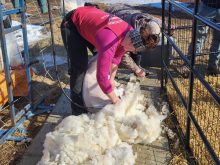Further litigation to keep the American border closed to Canadian cattle and other ruminants is unlikely following the July 25 release of a document from the United States Court of Appeals.
The written decision from the Ninth Circuit Court of Appeals in Seattle, Wash., said the lower court based in Billings, Montana, erred in its judgment that Canadian cattle and beef pose any risk to the American industry.
Federal judge Richard Cebull of Montana had already vacated a July 27 court date on whether a permanent injunction to close the border to Canadian cattle and beef sought by the U.S. cattle producer group R-CALF was needed. Cebull said he had to review the appellate court’s written decision before proceeding.
Read Also

Charges laid after cattle theft
Saskatchewan RCMP lay two charges against a man after six cattle went missing.
“I would suggest it would be very difficult to proceed to a permanent injunction when your preliminary injunction has so thoroughly been thrown out,” said Jeremy Russell of the National Meat Association.
“Point by point it discounts all of R-CALF’s case,” said Darcy Davis of the Alberta Beef Producers, which had requested intervener status in the July 27 case.
Those opposing R-CALF’s actions hope this is the beginning of market normalization for a battered industry that lost more than $7 billion since BSE was discovered in Canada in May 2003 and all borders closed.
Canada’s next push is for another U.S. rule to allow a wider range of meat products and cattle older than 30 months.
Stan Eby, president of the Canadian Cattlemen’s Association, is hopeful this ends the litigation, however producers must remain alert.
“Our contingency planning committees will not be disbanded in the short term. We don’t want to terminate things at this stage until everything is very clear and behind us,” Eby said.
In the unanimous decision written by judge Wallace Tashima, the U.S. court said the preliminary injunction was unwarranted.
The court further concluded the U.S. Department of Agriculture rule to resume trade would survive judicial scrutiny under the correct legal stand.
“R-CALF has not shown a likelihood of success on the merits of its action. We also conclude that R-CALF has failed to make the requisite showing of irreparable harm,” said the decision.
The court said trading with Canada does not stigmatize the U.S. cattle industry because consumer demand and confidence in American beef has remained strong since a case was found in Washington state December 2003. Further, Canadian beef had been flowing into the country since September 2003 with no ill effects to the U.S. industry.
If trading with Canada posed a true risk to the American beef industry, “one would not expect to see such a broad coalition of industry members supporting its implementation.”
The decision said R-CALF’s calculation of the prevalence of BSE in Canada was erroneous and the court erred in accepting that calculation.
As well, it said R-CALF lacks standing on environmental grounds since it appears its interests are economic.
No comments were available from R-CALF members.

















